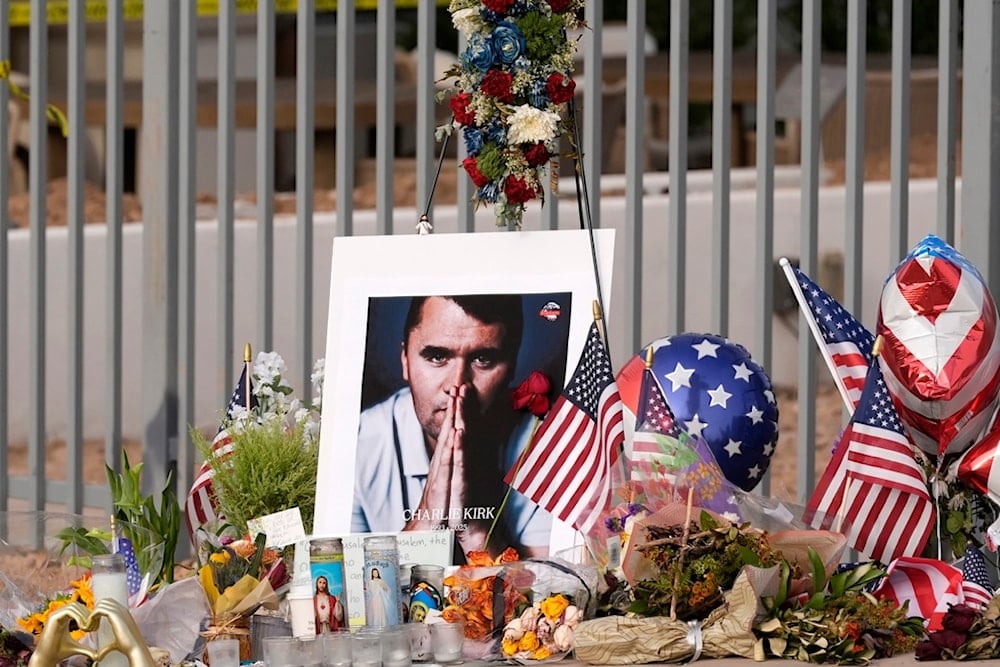White House drafts order on political violence after Kirk killing
Trump aides plan an executive order on political violence and hate speech as 120 nonprofits reject what they call efforts to undermine their work.
-

A makeshift memorial grows in size at the Turning Point USA headquarters after the shooting death at a Utah college last Wednesday of Charlie Kirk, Wednesday, September 17, 2025, in Phoenix, Arizona. (AP)
The White House is preparing an executive order on political violence and hate speech, a senior Trump administration official said Wednesday, as more than 120 nonprofit groups denounced what they called an effort to undermine their work.
The administration has stepped up scrutiny of left-leaning organizations following the assassination of far-right activist Charlie Kirk, a close ally of President Donald Trump. Republican officials have accused liberal groups of fostering hostility and intolerance, while avoiding criticism of right-wing figures accused of deepening US political divisions.
Details of the order, which could be unveiled later this week, are still being finalized by top advisors, including Stephen Miller, the White House deputy chief of staff helping lead the response to Kirk’s killing, according to the official. Trump is currently on a state visit to Britain, a factor that may influence the timing of the announcement.
Nonprofits push back
In an open letter published Wednesday, signatories from across the nonprofit sector, including the Ford Foundation, Open Society Foundations, Tides Foundation, Bush Foundation, and Carnegie Foundation, rejected what they described as an attempt to “exploit political violence to mischaracterize our good work or restrict our fundamental freedoms.”
“We reject attempts to exploit political violence to mischaracterize our good work or restrict our fundamental freedoms, like freedom of speech and the freedom to give,” the statement read.
The administration has accused liberal organizations of inciting riots and attacks on law enforcement, vowing to trace what it describes as networks promoting violence in US communities. Critics counter that Trump’s focus is selective, noting he pardoned some supporters convicted of assaulting police during the January 6, 2021, Capitol riot on his first day in office.
Broader campaign against liberal institutions
Officials have floated using the federal racketeering statute to prosecute groups alleged to fund left-wing violence and suggested some could be labeled terrorist organizations. Analysts say such steps would extend Trump’s longstanding campaign against institutions he deems hostile.
The administration has already withheld federal funding from universities, including Harvard and Columbia, accusing them of fostering liberal ideology and tolerating antisemitism. The Justice Department has also opened a probe into ActBlue, the main Democratic fundraising platform, while several large law firms have reached settlements requiring them to offer services to conservative causes.
Kirk killing exposes void of unifying leader
The assassination of Charlie Kirk has drawn broad condemnation but highlighted the absence of a national leader able to calm tensions, Politico reported earlier this month.
Speaking to the outlet, former Indiana Governor Mitch Daniels said he could not identify anyone positioned to calm tensions. Bill Daley, a onetime chief of staff to President Barack Obama, said that only President Donald Trump “represents everyone,” while Rep. Don Bacon hoped Trump would rise to the moment, though "populists dwell on anger."
Trump condemned the shooting at Utah Valley University in an Oval Office address, decrying the “demonizing” of opponents but also blaming “radical left lunatics” for vilifying Kirk, saying they compared him to "Nazis and the world’s worst mass murderers and criminals." The president’s history of incendiary rhetoric and threats against political foes has led some to question whether he can serve as "consoler-in-chief," as dubbed by Politico.
Trump demonizes yet hates demonization
What Trump accuses the left of doing, which is demonizing Kirk, Trump himself has long done to his opponents and political foes, making long rants on social media and even threatening to hold back federal funding from certain causes with which he has ideological disagreements.
Civil rights leader William Barber told Politico that cooling today’s violence may require “presidents, pulpits, and politicians” rather than a single figure. Others, such as former Bush Press Secretary Ari Fleischer, argued that leadership can still rally the country, citing post-9/11 unity.
Past presidents issued statements urging peace. George W. Bush said violence must leave public life; Barack Obama called the attack “despicable,” and Bill Clinton urged Americans to debate “passionately, yet peacefully.”
Yet analysts told Politico that few public figures now command trust across ideological lines. Michael Wear, a former Obama faith advisor, said Kirk’s death exposed a shift in politics: leaders once sought to persuade beyond their base, but today many win praise for channeling anger at opponents.

 4 Min Read
4 Min Read








